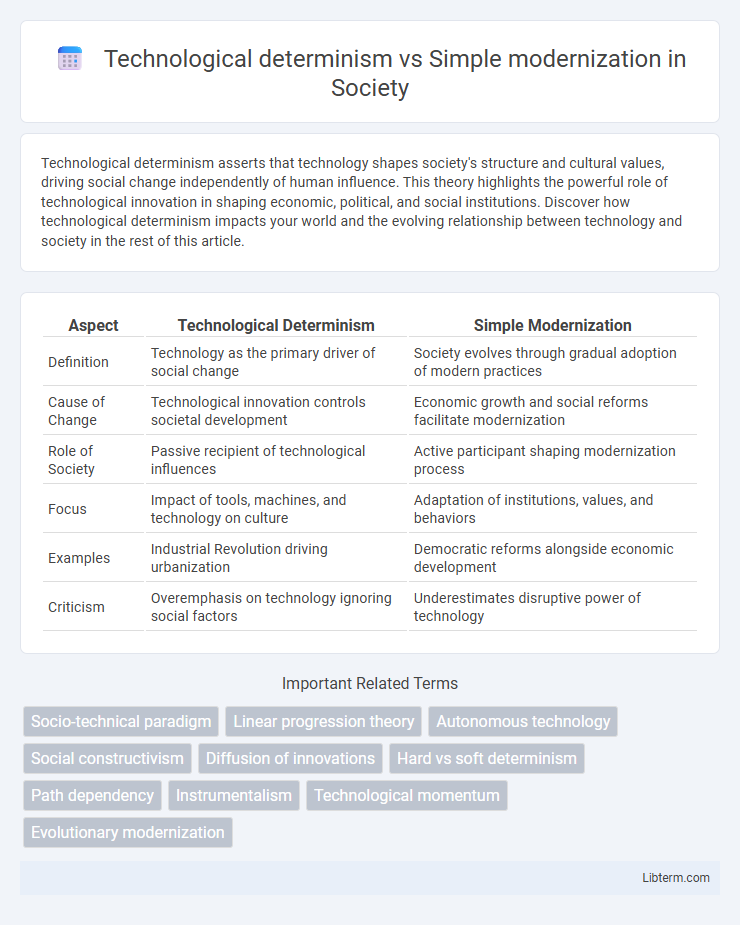Technological determinism asserts that technology shapes society's structure and cultural values, driving social change independently of human influence. This theory highlights the powerful role of technological innovation in shaping economic, political, and social institutions. Discover how technological determinism impacts your world and the evolving relationship between technology and society in the rest of this article.
Table of Comparison
| Aspect | Technological Determinism | Simple Modernization |
|---|---|---|
| Definition | Technology as the primary driver of social change | Society evolves through gradual adoption of modern practices |
| Cause of Change | Technological innovation controls societal development | Economic growth and social reforms facilitate modernization |
| Role of Society | Passive recipient of technological influences | Active participant shaping modernization process |
| Focus | Impact of tools, machines, and technology on culture | Adaptation of institutions, values, and behaviors |
| Examples | Industrial Revolution driving urbanization | Democratic reforms alongside economic development |
| Criticism | Overemphasis on technology ignoring social factors | Underestimates disruptive power of technology |
Introduction to Technological Determinism and Simple Modernization
Technological determinism asserts that technology drives societal change and shapes culture, suggesting that technological innovation is the primary force behind social evolution. Simple modernization theory emphasizes linear progress through economic development and institutional reforms without centralizing technology as the main catalyst. Understanding these concepts highlights the contrasting views on whether technology independently directs social transformation or if broader social factors play a determining role.
Defining Technological Determinism
Technological determinism asserts that technological innovations are the primary drivers shaping society's structure and cultural values, emphasizing technology's autonomous influence on social change. This perspective contrasts with simple modernization theories, which attribute societal development primarily to economic growth and political reforms, treating technology as one of many factors. Key proponents argue technology evolves independently and dictates social institutions, fundamentally redefining human behavior and historical trajectories.
Understanding Simple Modernization
Simple modernization theory emphasizes linear progress through industrialization, urbanization, and technological adoption as key drivers of social change. It argues that societies develop by following a predetermined path from traditional to modern states, focusing on economic growth and institutional reforms. This approach contrasts with technological determinism by attributing societal transformation primarily to human agency and socio-economic policies rather than technology alone.
Historical Contexts of Both Theories
Technological determinism traces its roots to 19th-century industrial revolutions, emphasizing how innovations like the steam engine and electricity reshaped societies by driving economic and cultural transformations. Simple modernization theory emerged in the mid-20th century during post-World War II development efforts, focusing on linear progress where societies evolve from traditional to modern stages through industrialization and technological adoption. Both theories reflect historical contexts shaped by industrial growth, colonialism, and the global spread of Western technological paradigms.
Core Differences Between the Two Approaches
Technological determinism posits that technological innovation is the primary force shaping societal change, emphasizing technology as an autonomous driver influencing social structures and cultural values. In contrast, simple modernization views societal development as a multi-faceted process driven by economic growth, political change, and cultural shifts, with technology playing a supportive rather than central role. The core difference lies in technological determinism's focus on technology as the independent variable, while simple modernization treats technology as one of several interdependent factors influencing progress.
Impacts on Society and Culture
Technological determinism emphasizes technology as the primary driver reshaping social structures and cultural norms, often leading to increased reliance on digital communication and automation that transforms human interactions and work patterns. Simple modernization theory views technological advancement as one aspect of broader socio-economic progress, where societal values and institutions adapt incrementally, promoting gradual cultural shifts towards urbanization and improved education. Both frameworks highlight distinct impacts on society: technological determinism underscores rapid, technology-induced change, while simple modernization stresses evolutionary development aligned with economic growth and social reform.
Examples of Technological Determinism in Practice
Technological determinism is exemplified by the widespread adoption of the internet, which revolutionized communication and shaped social behaviors globally, demonstrating technology's shaping power over society. The Industrial Revolution marked another key instance where mechanization dictated economic structures and labor patterns, highlighting technology's role as a primary driver of modernization. The rise of smartphones further illustrates this theory, as their integration into daily life transformed information access and social interaction patterns, underscoring technology's deterministic influence.
Case Studies of Simple Modernization
Case studies of simple modernization often highlight incremental infrastructure improvements and the adoption of basic technologies in rural development, exemplified by projects like South Korea's Saemaul Undong movement. These case studies demonstrate how gradual enhancements in education, agriculture, and transportation can spur economic growth without radical technological shifts. Emphasizing local participation and traditional practices, simple modernization reveals development trajectories driven more by social organization than by deterministic technological change.
Criticisms and Limitations of Each Perspective
Technological determinism is criticized for oversimplifying the complex relationship between technology and society by attributing social change solely to technological innovation, ignoring cultural, political, and economic factors. Simple modernization theory faces limitations for assuming a linear, universal path of development that neglects the diversity of social contexts and the potential negative impacts of modernization on traditional communities. Both perspectives are challenged for their reductionist views, often overlooking the multidirectional influences and feedback loops between technology, society, and development processes.
Conclusion: Reconciling Technological Determinism and Simple Modernization
Reconciling Technological Determinism and Simple Modernization requires recognizing technology as both a driving force and a component within broader social, economic, and cultural transformations. Emphasizing a nuanced approach allows for understanding that technology influences modernization processes while remaining shaped by human choices and institutional contexts. Integrating insights from both theories supports more effective policy-making and innovation strategies that balance technological potential with societal needs.
Technological determinism Infographic

 libterm.com
libterm.com